This story has been updated: On Monday, Patagonia's CEO Rose Marcario released a statement saying the company would no longer be purchasing wool from the Ovis 21 network. “It is impossible to ensure immediate changes to objectionable practices on Ovis 21 ranches, and we have therefore made the decision that we will no longer buy wool from them. This is a difficult decision, but it’s the right thing to do,” Marcario wrote. The statement also confirmed that Patagonia would not be eliminating wool products from their clothing line, saying, “We reject the notion that cruelty is essential to wool production, despite what PETA claims. Patagonia will continue to make products from wool because of its unique performance attributes.”
Earlier this week, animal rights activist group PETA documenting cruelty and inhumane treatment of sheep on a farm in Argentina that supplies wool to the clothing company Patagonia. The video, which is a graphic, bloody three-minute portrayal of sheep getting cut, stepped on, tied up, and castrated, was shot by an eyewitness at a farm that’s part of a supply group called Ovis 21, which Patagonia has been working with since 2011.
Patagonia immediately issued a response to the video Thursday. “While we previously understood the need to adopt a strict standard to ensure animal welfare and worked toward that goal, we were not aware of any animal welfare issues with Ovis 21 farms until now,” Patagonia’s release says. “We begin an urgent investigation into the practices shown in PETA’s video and commit to working with Ovis 21 to make needed improvements, reporting back to our customers and the public on steps we are taking.”
Patagonia partnered with Ovis 21 fours years ago in an effort to supply ethically sourced wool after an earlier PETA campaign showed that wool providers in Australia were mulesing sheep, a practice that involves removing skin from around the animal's buttocks to prevent infestation by fly larvae. The process is controversial though not universally condemned. “We worked to stop sourcing wool on the open (and untraceable) market as quickly as we could, and even delayed a major product launch of merino baselayers until we could find reliable sources for non-mulesed wool in New Zealand and Australia,” Patagonia’s statement says.
“PETA does not believe in the use of animals for any human purpose; this is a belief we respect but do not share.”
By fall 2012, all of Patagonia’s socks and some of its wool baselayers were being made from wool from Argentina’s Ovis 21 network, and by 2014, the brand’s entire Merino Performance Baselayer collection came from Ovis 21 wool.
As a result of its findings, PETA has started an online petition to get Patagonia to stop selling all its wool products. PETA is also logging an official complaint with the Argentinean government over the farmers’ actions.
“Having witnessed an astounding level of cruelty to sheep in every shearing shed we visited in Australia, the U.S., and, now, Argentina, it’s high time that companies and consumers ditch real wool,” says PETA President Ingrid Newkirk. “Today, finding alternatives to hide, fur, and fleece is easy, and no animal has to suffer when businesses make kind choices.”
Graham Stewart, the chief wool officer for , a small merino wool company in Bozeman, Montana, isn’t convinced that sheep mistreatment is widespread across the industry. “It’s not normal to treat sheep badly,” he says. “I’ve not come across any mistreated sheep anywhere and I’ve encountered a lot of sheep. This type of treatment is definitely the exception.”
But Stewart says it can be hard to ensure everything is clean in a large supply chain. “It comes down to commodity and volume. The higher the volume of wool, the less chance you have of keeping an eye on the process, and of course having suppliers in far-away places doesn’t help either,” Stewart says.
Patagonia wouldn’t comment for this story, but it's unlikely the company will eliminate wool from its clothing collections. “PETA does not believe in the use of animals for any human purpose; this is a belief we respect but do not share,” the Patagonia statement reads.
Patagonia, which is known as an industry leader when it comes to protecting human and animal rights throughout its supply chain, is also working with other brands and the on a project called Responsible Wool Standard, due out in 2016. The program will work to protect sheep from harmful practices, just like the company's Traceable Down Standard aims to do for birds.


